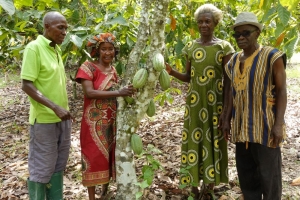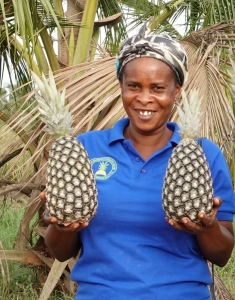“Let us work for the good of all”

This year, CCOW’s Fairtrade Fortnight campaign has two messages: “Let us work for the good of all” (Galatians 10:6a) and “Fair Trade: Everyday choices, exceptional results.”
The two messages reflect what we heard from Fairtrade farmers in Ghana, whom we visited just before Fairtrade Fortnight started.
As we travelled, we saw and heard about the extraordinary difference that everyday choices to buy Fairtrade products had made.
 What elements of Fairtrade were making the difference? One was the Fairtrade minimum price, which is often considerably higher than the amount of money farmers generally get for their products. It’s money that goes directly to the farmers, and the increase in income gives them the ability to do things that would otherwise be impossible. We met a cocoa farmer in a remote village, for example, who told us proudly that he had used the cocoa money to educate his daughters so that they could all become nurses.
What elements of Fairtrade were making the difference? One was the Fairtrade minimum price, which is often considerably higher than the amount of money farmers generally get for their products. It’s money that goes directly to the farmers, and the increase in income gives them the ability to do things that would otherwise be impossible. We met a cocoa farmer in a remote village, for example, who told us proudly that he had used the cocoa money to educate his daughters so that they could all become nurses.
Fairtrade premiums were a second important changemaker. The Fairtrade premium is money, based on volumes of sales, that goes to Fairtrade cooperatives to be used for community development. For example, Ghanaian cocoa cooperatives receive $240 for each metric tonne of cocoa their members sell on the Fairtrade market. Organic, fresh pineapple in Western Africa commands a premium of 5 cents/kilogramme.

Each cooperative’s members themselves decide how their premium money will be spent. We met women pineapple farmers who had their own farms, supported by their cooperative’s initiatives to help women enter the market. We met citrus farmers whose cooperative had enabled them to undertake more environmentally friendly methods of production. And we heard how cooperatives had used their Fairtrade premiums to set up schools, health clinics, toilet facilities – even banks and transportation services – in underserved rural areas.
A third key element of Fairtrade is empowerment. Fairtrade isn’t just about finances – it’s about giving producers more agency and access to knowledge. As we travelled, we heard about the work being done by Fairtrade Africa to help farmers implement the new Fairtrade cocoa standards and to improve their farming and business techniques. We saw Fairtrade-certified farmers starting new programmes in dynamic agroforestry, mixing different crops so that they would have income throughout the year, not just at the time of the cocoa harvests.
It was inspiring stuff – and great to know that we, as consumers, had played a part in making these developments happen. Our everyday choices are truly enabling producers to create exceptional results.
But at place after place, we also heard a message of concern, particularly around cocoa. In recent years, the market for Fairtrade cocoa has contracted, and this has had an impact. The cocoa farmer who had funded his daughters’ education was part of a cooperative that no longer had a Fairtrade buyer: as a result, they told us, instead of $240/metric tonne premium, they were now getting $80. Many farmers told similar stories. Alongside the pandemic, climate impacts, and inflation – which have hit everyone hard – they had reduced prices and premiums. This meant less money to spend on improving life for their families and communities. While they maintained their certification, citing both the hope of Fairtrade buyers and the support that the network gave, many were clearly finding life difficult.
Here in the UK, there can be a sense that we the work of Fairtrade is accomplished. Much has indeed been done, and we can celebrate that … raise high the mug of Fairtrade cocoa or the bar of Fairtrade chocolate!
But if we no longer press companies to stock Fairtrade products and no longer buy them ourselves – if we no longer explicitly take the time to show companies that we care about the people who are behind the products we use – the farmers will lose out. Because the imbalances of power that first spurred Fairtrade’s formation are still there.
The International Fair Trade Charter defines Fair Trade as “a trading partnership, based on dialogue, transparency and respect, that seeks greater equity in international trade. It contributes to sustainable development by offering better trading conditions to, and securing the rights of, marginalized producers and workers – especially in the South.
Fair Trade Organizations, backed by consumers, are engaged actively in supporting producers, awareness raising and in campaigning for changes in the rules and practice of conventional international trade.”
 Fairtrade works. But it only works if we continue the partnership alongside the producers.
Fairtrade works. But it only works if we continue the partnership alongside the producers.
The longer quote from Galatians is this: “Let us not grow weary in doing what is right, for we will reap at harvest time if we do not give up. So then, whenever we have the opportunity, let us work for the good of all ….”
This Fairtrade Fortnight, can you and your church recommit to Fairtrade?
- For more information on using Fairtrade in your church, see our handy guide. It includes suggestions for ordering goods that you used to get from Traidcraft.
- For information on Mothering Sunday and Easter gifts that support Fairtrade, look here. We would particularly encourage you to gather orders at your church for ‘The Real Easter Egg’. Deadline is 22nd March – so there’s still time!
- Could you write to a company that isn’t using Fairtrade cocoa, asking them to switch? Email us for a template letter.
